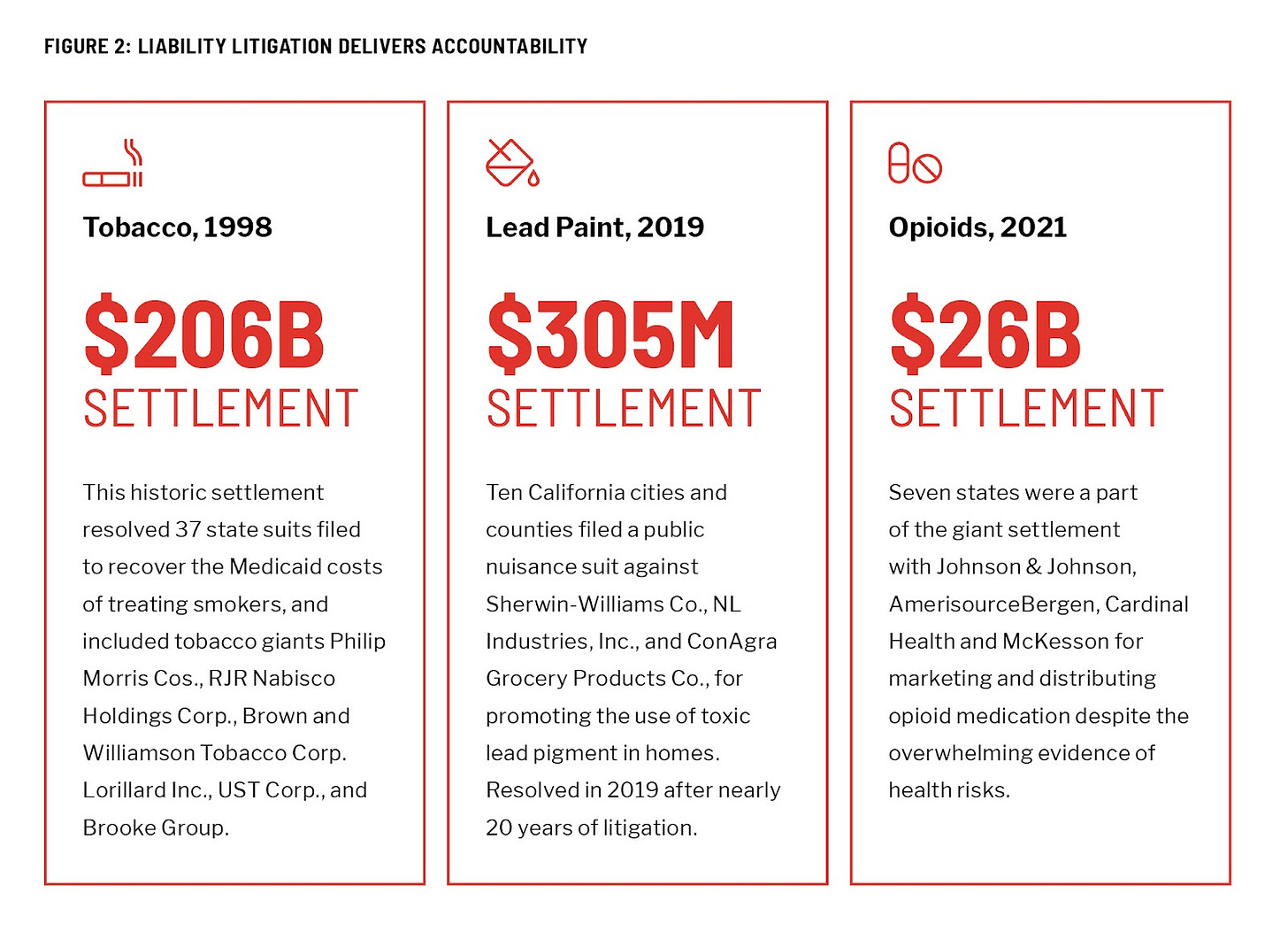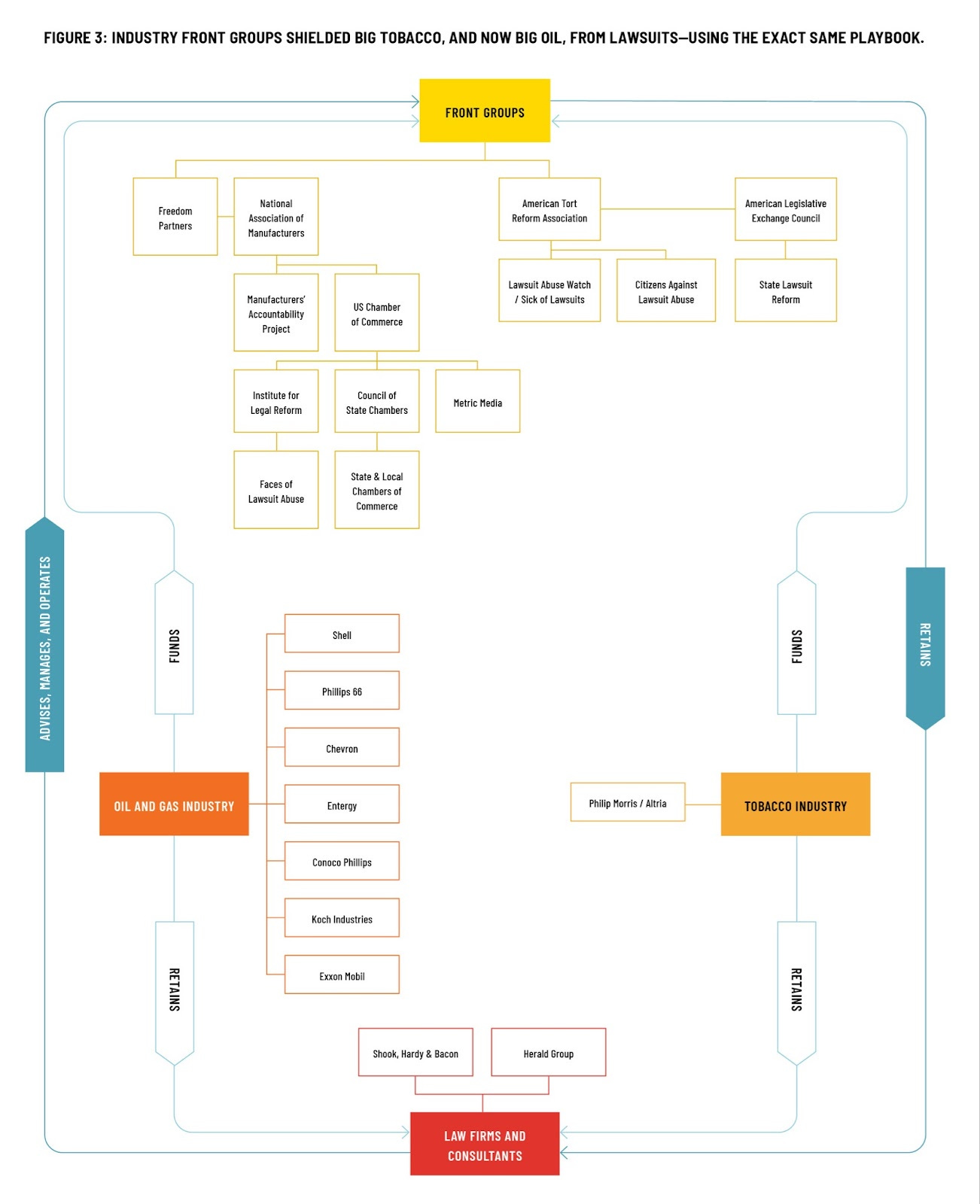Big Business wants to curb communities’ access to the courts
We documented the push to strip local governments of their right to file litigation — and the network of dark money front groups and corporate special interests pulling the strings.
Emily Sanders is the Center for Climate Integrity’s editorial lead. Catch up with her on Twitter here.
In a summer marked by one deadly heat wave, wildfire, and flood after another, local governments are facing higher costs than ever to protect their residents, compelling many to turn to the courts to make polluters pay for climate damages they knowingly caused.
Mayors from across the country view their ability to file these lawsuits to be so important that, at this year’s meeting of the U.S. Conference of Mayors in June, the nonpartisan group adopted a resolution to affirm their right to take fossil fuel companies to court. The vote was nearly unanimous, with only one of out the more than 170 mayors present voting against it. But the resolution wasn’t just a measure of support. It was also a condemnation of what the mayors called “a direct threat to municipal and taxpayer rights” — the growing push from industry-backed groups to make it difficult, if not impossible, for communities to take such legal action in the first place.
This week, the Center for Climate Integrity is releasing a new report about those efforts, “Pushing Preemption: The Corporate Campaign to Deny Municipalities Access to the Courts.”
The report — co-authored by yours truly — documents the corporate-backed assault on municipal access to the courts and shines a light on the web of shady actors behind it.
The story of municipal litigation spans decades, as communities have long turned to the courts to hold powerful corporations accountable for lying about the dangers their products cause. This list includes the manufacturers of tobacco, opioids, lead, asbestos, toxic chemicals, and, most recently, major fossil fuel companies responsible for the climate crisis. In many cases, such litigation serves as the only way for municipalities to recover the costs of addressing damages to their environment, public health, and local economies.
In recent years, a network of corporate special interests has mounted an attack on municipalities’ right to access the courts as a way of shielding Big Oil and other industries from having to pay.
In 2019, the U.S. Chamber of Commerce’s Institute for Legal Reform (ILR) published a playbook of proposed “legislative and judicial solutions that states can pursue” to reduce municipal litigation. The report, “Mitigating Municipality Litigation,” is blatant in its goals and tactics, laying out specific bills that state legislatures can pass in order to restrict and eliminate legal avenues for local communities seeking justice from lawless corporate actors.
These bills fall under four aggressive strategies identified in the ILR’s report:
These strategies present a particular challenge for smaller communities with fewer resources available to file a lawsuit on their own — often the same communities who are most harmed by corporate pollution.
Last year, the Chamber’s ILR published an update that focuses on the growing wave of climate liability lawsuits brought on behalf of municipalities across the country — and how best to quash them.
The Chamber of Commerce is working with other national front groups such as the American Legislative Exchange Council (ALEC) and the National Association of Manufacturers (NAM) to attack municipal litigation on multiple fronts.
As our report shows, individual corporations — including Exxon, Chevron, Shell, and Koch Industries — fund a sticky web of front groups to carry out their dirty work. At the helm are the Chamber, which advocates for preemption bills and files amicus briefs backing Big Oil in court; ALEC, which provides the legislative proposals that states can use as templates to preempt municipal litigation, and NAM, which runs smear campaigns directed at public interest organizations and elected officials supporting communities’ efforts at accountability.
This network of front groups honed its playbook while protecting Big Tobacco from legal liability, and has subsequently used the same strategies to ward off legal threats to countless other industries — including pharmaceuticals, asbestos, lead paint, and guns. The Chamber, NAM, ALEC, and a network of right-wing think tanks are part of a large web of organizations that also includes smaller, hard-to-track, dark money-funded groups with names that suggest high ideals, such as the Texas Public Policy Foundation, Texans for Legal Reform, the American Tort Reform Association, and the Civil Justice Reform Group.
Since 2019, municipal litigation preemption bills have been introduced in Arizona, Florida, Ohio, and Kansas, and one passed in Texas. These bills employ the same tactics recommended by the Chamber, such as preventing municipalities from hiring outside counsel and granting the state attorney general the power to prohibit local governments from filing suit.
But there are ways for elected officials to take action on behalf of their communities and protect and expand their right to seek justice. Our report recommends ways that elected officials can recognize preemption legislation before it becomes law, repeal preemption legislation through the courts and state legislatures, and take proactive measures to make it easier for communities to hold corporations accountable.
You can read the full shebang, “Pushing Preemption: The Corporate Campaign to Deny Municipalities Access to the Courts,” here.
ICYMI Roundup
Note: We are taking an August break next week! See you in September.




